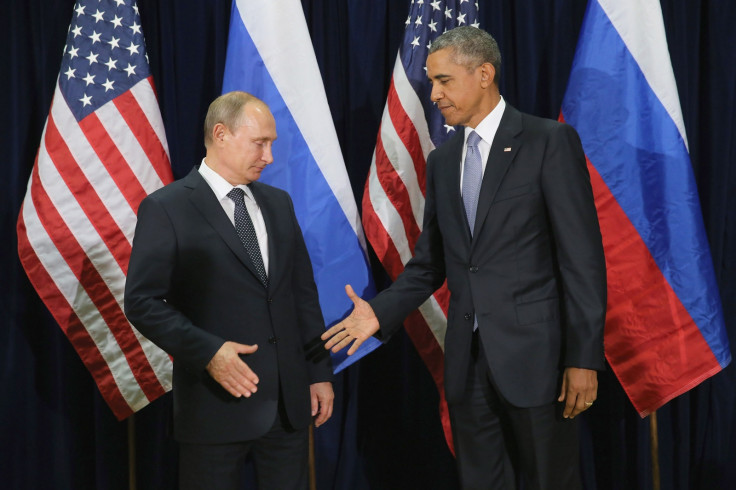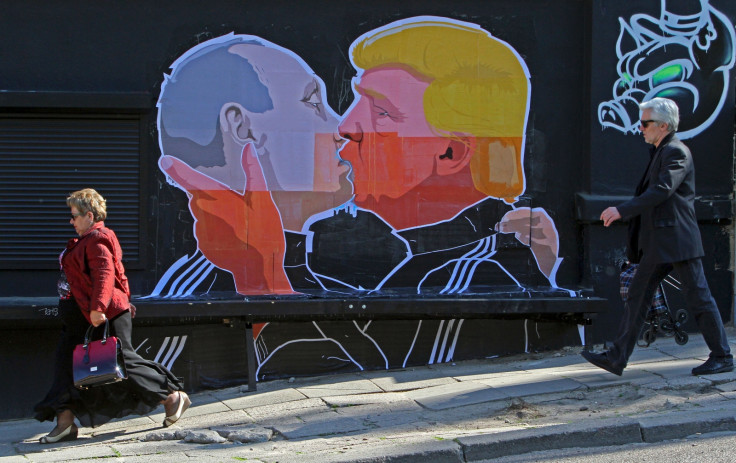Is Vladimir Putin Russia's grandmaster of chaos in our fractured age?
Putin has engaged in an extraordinary campaign of promoting and sponsoring political parties across Europe.

The hacking – and leaking – of embarrassing emails from within the Democratic National Committee (DNC) has been blamed, pretty convincingly, on Russia. If so, this should be a shocking moment: a naked attempt by Vladimir Putin's regime to interfere with the electoral process in another country.
It should be shocking. But it very much isn't. Not just because, in the age of Donald Trump, we've all had to deal with a relentless erosion of our capacity for outrage. But because Putin's Russia – the country that shut down a host of foreign-funded NGOs on the pretext that they were attempting to meddle in its domestic politics – has been engaged in a long-standing, remarkably successful and completely unsubtle attempt to do exactly the same thing.
We're all familiar with its track record in its own backyard: the invasion of Georgia, the instigation of a civil war in Ukraine and subsequent illegal annexation of a chunk of its territory.
But Putin's tentacles stretch far more widely. There are the most visible signs, of course: the megaphones of Russia Today (the TV news channel) and Sputnik News (the "alternative news" website). These pump out a relentless stream of stories designed to make the West look bad and Russia look good, as well as offering hefty appearance fees to sympathetic figures: George Galloway, for example, trousered £1,600 a week for two hours' presenting work.
But beyond such visible efforts, Putin has engaged in an extraordinary campaign of promoting and sponsoring political parties across Europe. Earlier this year, the Telegraph reported that US intelligence is investigating Russia's political activities in France, the Netherlands, Hungary, Austria and the Czech Republic. The Kremlin has built ties with Golden Dawn in Greece, loaned millions to Marine Le Pen's Front National via Russian banks, and agreed energy deals from which, according to the then American ambassador in Rome, Silvio Berlusconi benefited "personally and handsomely".
All this, says Ed Lucas, a senior Economist editor and author of The New Cold War, is part of "a long-running Russian attempt to manipulate both information and opinion in the West". Unlike its Soviet predecessor, Russia doesn't want to destroy the West, says Lucas: "What they want is for the West to be malleable – and for that to happen the elites have to be discredited in the eyes of the voters, and the collective security arrangements that we have must be weakened and broken. That's because, if Russia's dealing with a country bilaterally, it's always in a very strong position – 140 million people, $1.4trn GDP, nuclear weapons, and so on. But it's not at an advantage if it's dealing with the EU, or the West. So they want to play divide and rule."
As US Vice President Joe Biden warned last year, "President Putin sees such political forces as useful tools to be manipulated, to create cracks in the European body politic which he can then exploit." The remarkable thing, however, is the constellation of allies, or at least sympathisers, Putin has acquired in the process.
In Britain, for example, you have Seumas Milne, Jeremy Corbyn's hard-left consigliere and (in his previous life as a Guardian columnist) the loudest pro-Russian voice on Fleet Street. But you also have right-wing figures like Nigel Farage and Mail columnist Peter Hitchens: they would consider Milne a Trot and a traitor, but still admire Putin's ruthless streak. Even Nick Griffin, former head of the BNP, popped up in Moscow last year at a conference of fringe racist movements to proclaim Putin the saviour of Christendom against the infidel hordes.
"You see this left-right alliance all over the place," says Lucas. "In France you've got the Front National and you've got the Communists. In Italy you've got the Left, because they're anti-American, and the Right, who say they wish their leaders loved their country the way Putin loves his. In Germany, you've got Die Linke, the old Communists and West German Lefties, and Alternativ fur Deutschland, who are the new right-wing party.
"But what's really striking to me is that you also have what I call the greedy middle – businessmen, or people like Peter Mandelson, or the big German companies. These groups all hate each other, but they all believe we need to reset relations with Russia."
As far as useful idiots go, however, by far the most useful is Donald Trump. Trump has a long and ignoble history of saying very nice things about this very nasty man. "In terms of leadership, he's getting an A," he once said. When it was put to him that Putin had journalists and political opponents killed and invaded his neighbours, he replied: "At least he's a leader."

But the Trump-Putin ties go deeper than mere rhetoric. As a profile in Slate points out, Trump's businesses depend heavily on Russian investors. His list of foreign policy advisers is essentially a list of kooks and gadflies united solely by their sympathy for the Kremlin. And his new campaign manager, Paul Manafort, spent nearly seven years working on behalf of Victor Yanukovych, Putin's stooge in the Ukraine, as well as other shady pro-Kremlin billionaires from the region. Even before Trump sent shivers down eastern European spines by repudiating Nato's principle of collective defence, his campaign had – after showing no interest whatsoever in the minutiae of its own policy platform – intervened specifically to water down Republican support of Ukraine.
The fascinating question here is whether all of this – the fact that the West is manifestly a less stable, secure and united place than it has been for years – is down to luck or judgement. In other words, to what extent is Putin merely profiting from the chaos of our fractured age, and to what extent has he actively stoked it?
If you were of a conspiratorial cast of mind, you could certainly build up a trail of breadcrumbs. Take Brexit, for example. In addition to Nigel Farage's own admiration for Big Vlad, there was the Leave.EU movement founded by insurance tycoon Arron Banks. Banks's wife is Russian, and has indeed been accused of being a spy, though without much evidence. (To show her what he thinks of the idea, he bought her the licence plate "X MI5 SPY" as a Christmas present.) But Mrs Banks did get help staying in the country from Mike Hancock, the disgraced Lib Dem MP who had a four-year affair with a suspected Russian spy, and bowed only to Seumas Milne in his admiration for Putin. And then there was the fact that Milne and Corbyn, despite theoretically being on the Remain side, seemed determined to sabotage their own campaign...
Having interviewed Banks, it seemed pretty clear his intervention in the referendum was entirely out of personal conviction. Likewise Corbyn's long-standing antipathy to the EU, which he sees as a neo-liberal tool for attacking workers' rights. But I've still heard whispers in Westminster that Putin might – 'must!' – have played some kind of role in the Brexit campaign, not least because of how perfectly it suited his purposes, and how delighted he and his cronies were about the result. The problem is that when it comes to the Kremlin's activities, there are, as Lucas puts it, only a few "outcrops of clear fact" – surrounded by much guessing and speculation.
In the end, the idea of Putin as puppetmaster can be almost a comfort. It reassures us that the West's troubles – its economic vicissitudes, its political polarisation – are not our own fault, but are visited upon us by a ruthless, fiendish enemy. The truth is, we got ourselves into this. What Putin is doing, by stoking extremism and division, is ensuring that it's that much harder to get out.
Robert Colvile is a writer and commentator on politics and technology, and the author of 'The Great Acceleration: How the World is Getting Faster, Faster' (Bloomsbury)
© Copyright IBTimes 2025. All rights reserved.






















